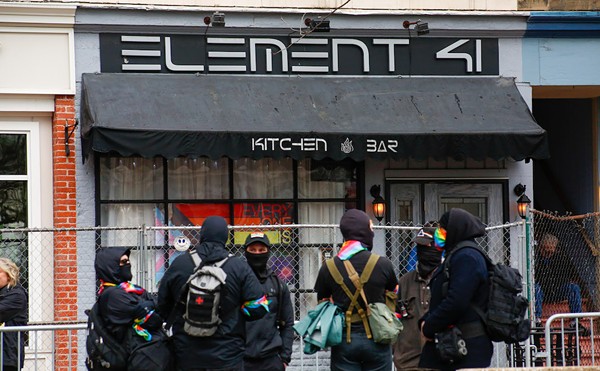Ken Vail, founder of Xchange Point, the ballsiest needle-exchange program in the city, wears his calling on his agency's T-shirt. "The point is to save lives," reads the logo. Vail looks more Santa Cruz--where he lived for thirteen years--than Cleveland, with his long ponytail and his laid-back demeanor. His appearance masks a much more complicated person: intense, intellectual, and impassioned. These days, he's working a lot at the computer, trying to save the world in a sun-soaked corner of his living room.
He hasn't always lived in an apartment this nice, he feels the need to explain. His fiancee happens to work for a bank. Vail seems more comfortable in the crime-ridden Glenville neighborhood, where he still, on occasion, trades used needles for clean ones and passes out condoms, bleach, and information about safe sex and communicable diseases. His work--trying to save drug addicts from the scourge of AIDS--is selfless and noble, but not so the persona Vail has built for himself as Xchange Point's executive director.
"Ken is a mixed blessing," says Chrisse France, director of the AIDS Taskforce of Greater Cleveland. "He's burned some bridges with a lot of people because he's so mission-driven. I think he sincerely believes in what he's doing. But is he doing it for Ken or is he doing it for the cause?"
Vail has come almost full circle. He's gone from being a junkie to being a victim to being vilified by people who once supported him. Sixteen years ago he was slowly killing himself with heroin on the streets of Santa Cruz, California. Now former supporters say he's killing his organization.
Vail brews a pot of coffee, but doesn't drink or offer any of it. He takes a seat on the futon and attacks each criticism levied against him with thoughtfulness and punch. Vail is a natural at orchestrating the attack, at lobbing fireballs at people who don't support his cause. But since the April 2 edition of Gay People's Chronicle hit the newsstands, he's getting used to playing defense.
Vail produces the newspaper--folded to the letters page--and launches into a point-by-point rebuttal of a scathing missive written by former Xchange Point board member Luis Santiago. Savvy and straightforward, Vail tries to morph the picture of himself that Santiago and others have painted: that he is self-serving. That his ego eclipses his mission. That his "dictatorial" style has crippled his program. Vail says none of this is true, that he's just a man who gives clean needles to junkies.
"Maybe I rub people the wrong way," he says. "Maybe I piss people off. I didn't get into this for people to like me. I got into this because people I knew were dying."
Vail has faced many trials in his forty years. But this may be the most challenging one yet. For once, his adversaries are not the mayor or the city council or the police. They won't be swayed by a high-powered lawyer, lofty humanitarian arguments, or media spin-doctoring. This time, his detractors are fellow needle-exchange proponents who see through all of that. They too want to protect Cleveland's 11,500 intravenous drug users from the ravages of AIDS. But they believe Xchange Point has been more of a failed ego trip for Vail than an effective harm-reduction program.
While Vail has proven many times over that he is the quintessential activist, his track record suggests that he has not been an effective administrator. In just under three years, Xchange Point has only exchanged eight thousand syringes--an amount the Free Clinic of Greater Cleveland has exchanged in less than three months. Instead of giving sterile syringes to drug addicts, Vail has been fighting fires and igniting controversy. And his organization isn't the only one getting burned.
Vail's constant, well-publicized feuds have cast all needle-exchange programs in a negative, adversarial light. The greatest tragedy about his organization is not what it has done, but what it could have done. And the repercussions of this failure are being felt not just by intravenous drug users who inject themselves with HIV-tainted needles, but by the entire community. Prompted by Santiago's letter, Vail's critics are voicing their true feelings--not because they want to bring him down, but because they want to keep him from dragging them all down with him.
"Because of his personality and the bridges he's burned, it's going to be very hard for any organization like this to get started again," says Adrienne Boles, a former volunteer who worked closely with Vail at the Xchange Point for a year. "He gives needle exchange a bad name."
An Ex-Junkie's Story
Three middle-aged ex-junkies driving a rusty Oldsmobile with a Harvard University bumper sticker on the back window pull up to a convenience store in Glenville. The first to get out of the car spots Vail giving out condoms across the street and excitedly waves him over.
They know him from the old Xchange Point drop-in center on East 105th. "He used to give us free works," says Will Knox, a former heroin addict. "When we see white people in this neighborhood, most of them are just trying to make themselves look good. But Ken, he all right."
There's another reason Vail doesn't get hassled in this neighborhood. It has as much to do with who he is as what he's doing here. Vail can empathize with drug users, because he is a former IV drug user himself. And he is not shy about telling his life story.
Vail grew up a long way from the crumbling chaos of the urban ghetto, in the little town of Warren, Arkansas, where he graduated seventh out of a high school class of ten. College didn't work out, he says, because he was too busy selling marijuana. But he didn't realize that Warren (population: 216) was a dead end until a close family friend exposed him to a little tough love, Southern man to Southern man.
"A friend of my mom's pushed me onto the hood of a car one day and told me, if I didn't get out of there, I was going to end up dead or in prison for the rest of my life," Vail recalls.
He took the strongly worded advice and moved to Portland, Oregon, where, at 21, he injected cocaine for the first time and became addicted right away. It took him two-and-a-half years to try to quit. He was sick, strung out on cocaine and methamphetamines, and weighed a mere 175 pounds (He's six-foot-five). On a Friday, he walked into a drug-treatment center and asked for help.
"They said, 'We're closed, come back on Monday,'" Vail remembers. "I kept using for a couple more years."
He tried moving back to Little Rock, Arkansas, to live with his father. But he couldn't kick the drug habit for long. He gravitated west again, this time to Santa Cruz. He stole a $500 gold chain, got arrested, and was sent to jail. After his release, the cocaine stopped working for him, so he started shooting heroin. He wasn't a heroin junkie for long, because it all but killed him. Soon after switching to smack, Vail found himself sleeping on the floor in somebody else's apartment, shooting whatever remnants of the drug he could get out of other people's used cotton. He got himself into a rigid, residential drug-treatment program--because, he says, he didn't have the guts to commit suicide.
The program was a different sort of nightmare for Vail, full of strict rules designed to humble and humiliate. "I had to wear a sign that said 'I'm a baby,' he remembers. "I had to wear a pacifier and Mickey Mouse ears." For nine months, he followed the three F's: "No fixing, no fucking, and no fighting--or you're out."
Vail did what comes natural to him and resisted. Instead of letting the program work by stripping him of his defenses, he says, he tried to break down others. He would make them angry as a distraction from dealing with his own problems. Because of that, his path to recovery was slow and troubled. After nine months, he decided he couldn't handle it anymore and left.
By sheer luck, he says, he ran into a counselor who talked him into going back. This time, the counselors made him sit on a bench for a solid week. He had to eat there and sleep there. He could only get up to go to the bathroom, which he couldn't do without permission.
Maybe it was all that time by himself. Maybe it was just time. Vail says he honestly doesn't know. But that week on the bench got him through the final stretch of his treatment. "One day I asked to go to the bathroom, and they didn't respond for whatever reason, and I got up off the bench and left," he says. "I've been clean ever since."
That was in July 1984. To this day, Vail says he doesn't drink alcohol or use drugs. He went on to get a bachelor's degree in cultural anthropology from the University of California, Santa Cruz, where he grew tired of sitting in class and volunteered for the Santa Cruz AIDS Project. By 1989, he was pioneering one of the first
needle-exchange programs in the country.
The approach was simple. Vail and the other volunteers just asked people, "What do you need?" The drug users said they needed clean needles. Vail says the volunteers got them from a guy with a diabetic cat. They exchanged them for used syringes, which the clients dropped into Folgers coffee cans.
"Ken is one of the founding members of the movement," says Allan Clear, executive director of the New York-based Harm Reduction Coalition. He says the Santa Cruz program was significant because it successfully targeted a hard-to-reach transient population of young IV drug users.
This year, the Santa Cruz Needle Exchange Program celebrated its tenth anniversary.
An Activist Is Born
After earning a graduate degree in public health from Boston University, Vail moved to Cleveland in 1994 to pursue a master's in medical anthropology. That year, the number of people in the city with AIDS reached 2,000. In January 1995, Mayor Michael White declared that dire action was necessary to curb the spread of the disease. An emergency order was issued approving tightly restricted needle-exchange programs.
Needle exchanges are controversial, but effective at reducing the spread of HIV among IV drug users by applying the theory of harm reduction. Proponents accept as fact that some people will always use illegal drugs. Harm-reduction measures are designed to reduce the health risks associated with drug use without necessarily requiring users to stop using drugs.
"It's not so much that we're out to get people clean and sober," says Roy Szubski, the Free Clinic's HIV Services Program Director. "We're out to take small steps. If they want to take steps toward detox or abstinence, we'll take whatever steps we can to get them there."
Harm-reduction programs have been linked to lowered rates of HIV infection among IV drug users in New York City and in European countries where needle exchange is widely practiced. Local statistics on the successes of harm reduction do not exist. However, Szubski considers it a positive sign that, out of thirty needle-exchange clients who took an oral HIV test recently, none tested positive.
The Free Clinic started the first needle-exchange program in Ohio shortly after the emergency order, hiring Vail to run it. But the program wasn't immediately successful. Certain that he was the most knowledgeable person in the city about needle exchange, Vail switched into activist mode, lobbying hard for change. The strategy backfired. In 1996 Vail was terminated over what he says were philosophical and personality differences with Free Clinic Director Martin Hiller.
Hiller will not discuss the reasons for Vail's termination. But he insists that disagreement over the methodology of conducting needle exchanges was not "the critical factor in our decision to part company with Ken."
"I was devastated," Vail says of his termination. But given the number of uninfected intravenous drug users in Cleveland--the highest in the state--he felt certain another needle-exchange operation could thrive here. Despite city-supported efforts to curb the transmission of HIV in Cleveland, AIDS rates remain high and have actually increased among IV drug users. By the end of March, 2,649 people had been diagnosed with AIDS, 18 percent of whom were IV drug users, according to the city health department. The black and Hispanic communities have been hardest-hit, with IV drug use cited as a possible mode of transmission for 20 percent of blacks and a whopping 49 percent of Hispanics with the disease--compared to only 11 percent of whites.
Vail knew people who were interested in starting a second needle-exchange program, and he held strategy sessions with them at his house. The group decided to target a drug-infested area of Glenville, but Vail ran into trouble with the city right away. He couldn't exchange needles, he was told, because his program did not comply with city requirements to provide HIV testing and counseling along with clean needles.
After negotiations with the city proved futile, Vail staged his first act of public defiance in October 1996. With the blessings of his board of trustees, he started openly exchanging needles on the street. Vail's activism sparked overwhelming support from AIDS advocates nationwide, including letters from prominent needle-exchange advocates and Internet postings from the Drug Reform Coordination Network, urging supporters to contact city officials and Cleveland media.
In December 1996, Vail's reputation as a hard-driving crusader was buoyed when former city Health Director Robert Staib called him in for an emergency meeting and ordered him to stop exchanging needles. Vail insisted he was operating within the law and continued his work.
A few weeks later, the city rewrote the order, adding new restrictions that seemed unduly prohibitive on Xchange Point, while leaving the Free Clinic's program unaffected. Staib wrote letters to Xchange Point board members, informing them that police surveillance units had concrete evidence Vail was conducting needle exchange in violation of the order. He threatened both the board members and Vail with prosecution.
Vail says the city's actions were more an attempt to quash his efforts than a move to protect the public health. "Having talked with people from the city," he says, "I've had them tell me directly, 'This is all about Ken Vail.'"
Nevertheless, two board members resigned, and Vail ceased the needle-exchange component of his work for the next four months. But he did not keep silent. He secured legal representation by high-profile attorney Terry Gilbert and threatened the city with a discrimination lawsuit. The city revised the order again, dropping the requirements seemingly directed at Xchange Point. By May, Vail and his volunteers were back on the street.
"The city understands I'm not going away," he told The Plain Dealer triumphantly. But the victory was short-lived. Vail had barely smoothed over one controversy before he seemed bent on creating another.
In August 1997, Vail moved Xchange Point into a building on East 105th Street in Glenville, opening a drop-in center for drug users without first talking to the area's councilman or neighborhood leaders. The center violated the city's order, because it was across the street from a day-care center--a designated "protected institution"--and did not have community support.
Former Xchange Point Medical Director Joy Marshall says educating the community is a necessary component of successful needle-exchange programs. But in Glenville, the drop-in center was literally "'Mister White' and all his white friends moving into a black neighborhood because 'that's where the needles are,'" she says, quoting Vail. "We were not able to serve the people because of the way this was done."
Vail recalls his move into the East 105th Street site as being much less dramatic. It's true that he didn't talk to church and neighborhood leaders. But he and his volunteers had canvassed that area for months, he says, without anyone ever telling them to leave.
In January, as if on cue, Vail came under fire from the city for violating the order yet again. So Vail left the center and began exchanging needles on the street. In April 1998 he was arrested for violating the section of the order that prohibits the exchange of needles within a thousand feet of a school, church, playground, day care, or recreation center without community permission.
While Vail was busy fighting the city and the cops, the Free Clinic's low-key needle-exchange program prospered, unencumbered by public spats or legal problems. Despite the Free Clinic's slow start (only eighteen clients were enrolled in the first five months), the program picked up in 1997, after a consultant from the North American Syringe Exchange Network suggested modifications. In December 1997, the Free Clinic exchanged 831 syringes, compared to 270 in May 1997. In September 1998, it exchanged 3,251. As of January 1999, the Free Clinic had enrolled 403 people in its needle-exchange program.
Instead of courting his former employer and ideological ally, Vail turned on it, writing a damning letter in June 1997 to a doctor who was considering making a donation to Xchange Point. "I believe the intention of the Free Clinic's needle-exchange program staff is commendable," he wrote. "But the lack of 'know-how' and the executive director's concerns with the 'controversial nature' of needle exchange set it up to fail."
But the numbers, particularly compared to Xchange Point, show just the opposite. While Vail did not provide a month-by-month statistical breakdown of his work, he says his organization exchanged eight thousand syringes over the last three years. In just a three-month period, from October to December 1998, the Free Clinic exchanged 9,792 syringes.
Given the organization's tumultuous recent history, it's no wonder Xchange Point's numbers lag behind those of the Free Clinic. And it's not as if the two programs are competing. But Xchange Point's low numbers concern local AIDS advocates, who point out that, for needle exchanges to have a serious public health impact, they must distribute large quantities of clean needles.
"To stop HIV, you have to exchange enough needles so most of the people can use clean needles every time," says Johnbuck Creamer, a registered nurse who developed the training program for Xchange Point volunteers. "The only way to be effective is to become mainstream--not accepted, but big enough to get all those needles out."
Board member Sam MacMaster says the numbers have lagged because "There's always been something getting in the way of the social service."
That something, a number of former supporters say, is Ken Vail.
Burning Bridges
By Vail's own admission, Xchange Point's tumultuous history has hindered its effectiveness. "If we had more staff and we had to spend less time fighting and putting out fires, this would be a model for doing needle exchange in the city," he says.
The organization's 1998 budget, according to information provided by Vail, was $44,257. The projected budget for 1999 is about $50,000. This year, Xchange Point is being supported mostly by government funding, which cannot be used to exchange needles. But Vail recently learned that the AIDS Funding Collaborative is giving his agency a private $3,000 grant to relocate the drop-in center and for volunteer recruitment.
While that grant helps, other sources of funding are drying up. A significant grant from the AIDS Funding Collaborative for a drop-in center and other projects did not come through this year. A November 9, 1998, letter from Beth Volz of the Cleveland Foundation indicated that she had some concerns about the use of the $24,730 grant Xchange Point received in 1998. Rick Kemm, assistant director of community investment for United Way, which administers the Collaborative's funding, did not say whether those concerns sparked its decision not to fund Xchange Point for the second year in a row. Kemm says it is against the Collaborative's policy to discuss funding decisions. (The Collaborative did, however, re-fund the Free Clinic's needle-exchange program.)
The dearth of funding has severely limited Xchange Point's activities. No more drop-in center means no more active users' support group and no more group instruction on harm reduction, among other activities. Vail says the organization has a surplus of syringes, but has had to cut back on condoms and other supplies. While Vail will still give handfuls of condoms to sex workers because "they're in the business," he'll only give three apiece to drug users and regular people on the street.
The financial strain has also cut into staffing. At present, Xchange Point has only three paid employees--an active user who does outreach work and Operations Manager Dave Geiger, both part-time, and Vail, who technically gets paid for seven hours of work a week, even though he works full-time. (Vail's salary last year was $18,615.)
The obvious way to counteract a lack of funds is to make friends in the right places. Until recently, Xchange Point had one in Joe Cimperman. The 28-year-old city councilman, a former AIDS hospice worker for the Jesuit Volunteer Corps in Baltimore, supported the agency's efforts.
When Vail was forced to vacate the East 105th Street drop-in center early last year, Cimperman suggested a site on West 25th Street in his ward. The building would have met the city's regulations. But Vail says it needed too much work, and the rent was too expensive. Cimperman offered to help the organization find funding, but Vail declined the offer. Cimperman says he got frustrated with Vail and backed off.
In January, Vail moved the organization into a building on St. Clair near East 41st Street, which was also in Cimperman's district. Vail says he chose the site because it complied with the city's requirements and was centrally located between the East and West sides, easily accessible by bus. But for some volunteers and board members, it seemed like unpleasant deja vu.
"We were adamant about talking with the churches and the people in the neighborhood," former volunteer Boles says. "But Ken just didn't want to do it. He would always have a whole realm of excuses about why he would put it off." (Vail says he isn't opposed to community notification, but doesn't think it takes priority over the agency's other work.)
The way Cimperman recalls his next meeting with Vail was predictive of their current relationship. Once again, Vail seemed more intent on being the activist than on playing by the first rule of politics: Be nice to people who can do things for you.
"I saw Ken in a restaurant," Cimperman recalls. "He slapped his card down on the table and said, 'If you still care about people with AIDS, give me a call.'"
It was a bad move. "I mean, enough with the messiah complex," says Cimperman. "A lot of people care about AIDS in Cleveland. He doesn't have a monopoly on that."
Vail doesn't recall making that statement to Cimperman, but he clearly alienated the councilman. Shortly after Xchange Point moved to St. Clair, neighborhood leaders began calling Cimperman, complaining that the agency was in a building with structural deficiencies, including no functioning plumbing. Cimperman felt obligated to call building inspectors.
"When you open up a place like that without talking and cooperating with people, you open yourself up to an extra amount of scrutiny and criticism," he says.
Vail's response was a press release, sent out on March 5, complaining that "City of Cleveland Councilman Joe Cimperman is placing extensive and unnecessary pressure on the owner of the building which houses Xchange Point, via spurious code violations, to force Xchange Point to relocate."
Board President Jondarr Bradshaw wrote, "Councilman Cimperman seems to be more concerned about advancing his political career than he is about slowing the spread of HIV, which is devastating Cleveland's African American and Hispanic populations."
Another press release followed three days later, this time accusing Cimperman of trying to drive Xchange Point out of his ward. But it was a losing battle. Vail says his board did not think it financially wise to follow up on an appeal of its eviction. The agency vacated the premises in April, losing its last drop-in site.
For Vail, the whole ordeal has a "been there before" kind of feeling. He blames the city order and a tight budget, and says there were plans to bring the plumbing and other problems up to code. And despite the barbed tone of his press releases, he says he doesn't blame Cimperman for what happened, and he insists that he would like to work with the councilman in the future.
As proof, Vail offers a copy of a March 13 letter. "Councilman Cimperman, let me begin by apologizing for any undue pressure you may have recently received from the local media," Vail wrote. "Xchange Point's response to the notice of building-code violations was simply an act of self-preservation
. . . I hope that we can move beyond any personal differences so that our mutual vision of how HIV prevention work should be conducted in Cleveland can be realized."
But Cimperman says he never received the letter. Nor is he the only supporter Vail has lost. Since the city dropped its criminal charge against him for violating the emergency order last October, Xchange Point has suffered a steady defection of volunteers and board members.
"I felt that my being a board member was a joke," says Marshall, who quit the board last fall. "All the members were a joke. It was clear who was running everything."
Vail hand-picks his board, including Xchange Point's treasurer, Nathalie Lemaire, his live-in fiancee. Complaints have also been voiced about Vail's "dictatorial" management style, his inability to keep volunteers, his travel expenditures, and the organization's ineffectiveness.
No critic has been louder than former board member Luis Santiago, a doctoral student in epidemiology at Case Western Reserve University. While Santiago and Vail share the same passion for AIDS prevention through needle exchange, the two seem to have arrived there on totally different spaceships.
A native of Bayamon, Puerto Rico, Santiago is a former army intelligence officer who was drawn to HIV prevention while pursuing a graduate degree in public health in his native country. "Once I went out [doing needle exchange] for the first time, I was hooked," says Santiago, who says he has no history of drug abuse. "You see you're making a difference right away."
Santiago is now a consultant epidemiologist for a harm-reduction program in Puerto Rico. When he visits drug houses there, he says, he usually exchanges needles at a rate of five hundred an hour. The work is much more dangerous than it is here. Junkies bring piles of dirty needles and often start injecting themselves with heroin before the trade is even completed. Santiago offers pictures of men and women with open sores injecting themselves in full view of health workers, piles of used needles at their feet.
On a Saturday morning, Santiago pulls his car into a supermarket parking lot on Clark Avenue near West 25th Street. Just a few feet from the car, the sun glimmers off an exposed needle on the ground. Santiago looks around for cops and then carefully picks it up.
One of only four city-approved needle-exchange sites is a short drive from the parking lot. There's almost no foot or vehicle traffic, and with very little outreach to notify users where and when to exchange needles, Santiago typically went home with only the ones he found on the street. In four months of volunteering about thirty hours a week, doing both needle exchange and outreach work, Santiago says he saw Xchange Point exchange just seventeen needles.
"Compared to needle-exchange programs in New Haven [Connecticut], New York City, Puerto Rico, or even the Free Clinic, [Vail] isn't doing anything," Santiago says.
After discussions with Vail about increasing outreach and making other changes proved fruitless, Santiago sent a copy of his resignation letter to Gay People's Chronicle, in part responding to an article about the St. Clair building-code violations.
"As a former board member for the Xchange Point, an organization run by Ken Vail, I would hate to see the program scrutinized simply on the basis of building-code violations," Santiago wrote. "In fact, this will perpetuate the martyr image that Ken Vail has used so far to establish an organization which only serves his personal interest."
Santiago went on to criticize Vail for not doing outreach, spending money on business lunches and excessive travel instead of condoms, being "emotionally involved" with the board treasurer, and being untruthful about the success of the program. Santiago said he would "make it my mission to let my feelings about the program be heard around the Hispanic community."
That could hurt the agency's stated goal of doing outreach in the Hispanic community, for which it just received a $38,439 grant from the city, despite the fact that it no longer has any Hispanic staff or board members.
Vail did take two business trips in the past few months, one to a harm-reduction conference in Geneva, Switzerland, for two weeks--just as the agency was about to be evicted from the St. Clair center. Board Vice President Joe Carroccio says the trips were approved because they are important fund-raising and idea-generating events.
Carroccio, a longtime AIDS activist who started giving away clean syringes on the streets of Cleveland with ACT UP in 1993, defends Vail and attacked Santiago's credibility in a follow-up letter to the Chronicle. He says Santiago only came to one board meeting in the three months he was on the board.
Carroccio says the board's investigation of the agency's records showed no misappropriation of funds. He also contested Santiago's charges that the program is ineffective.
"It is really too bad that Mr. Santiago feels he needs to tear apart the Xchange Point in the Hispanic community due to his personal animosity toward Ken Vail," Carroccio wrote.
If there is some personal animosity between Santiago and Vail, it is because both are impassioned about their work. Given their strong personalities and firm mindsets, it's not surprising to hear Vail's claims that Santiago resigned after cursing him and physically threatening him (Santiago denies ever making violent threats). Nor to hear Vail add, "I think he could have been a real asset . . . It was difficult for him to be my boss [as a board member] and for me to be his boss [overseeing a volunteer]."
But Vail's difficulties with volunteers extend beyond Santiago and apparently have been a major impediment to the organization's growth. Former volunteer Boles says she and other volunteers were put off by Vail's overbearing management style, his unwillingness to educate the larger community about the program, and his personal refusal to do outreach.
"I felt embarrassed to be involved with that organization," she says. "I feel that, if you are going to put that much time and energy into something, you better be able to back it up 100 percent, and I couldn't."
Former volunteer Kristen Grubbs, a student intern with Xchange Point until two months ago, says, "Ken has run off almost every volunteer who's walked through the door."
Boles and Grubbs both say some volunteers were helping distribute needles on the street despite the fact that they had not been trained in CPR and blood-borne pathogens, as the city's order requires. Vail says he has no knowledge of that.
"Only trained people handle the needles," he says. "If they're doing needle exchange and they're not trained, I want to know about it."
In the days when the health department was threatening Vail with prosecution, volunteers left because they were afraid they would get arrested or lose their jobs. Since then, however, Vail acknowledges that others have left because of him. He doesn't deny that he's made some mistakes managing individual volunteers and says he has learned from those experiences.
And when the criticism grows too hot, Vail can retreat to Glenville, where people still remember the time he saved the life of a junkie who overdosed in a garbage-strewn lot. This is where Vail still tries to get all the discarded syringes off the sidewalk before any of the neighborhood children do. And this is where the same gaggle of weathered, aging black men drop dirty syringes into the biohazard container in the trunk of his car. To him, this is the best defense for the argument that he has failed to turn Xchange Point into an effective harm reduction program.
"It comes down to the people on the street and my board," Vail says. "The day the people on the street tell me I'm self-serving, I'll walk away."
Road to Recovery
No one accuses Vail of having a lack of dedication--just of dedication gone askew. One former board member, who asked not to be named, describes him as an activist who, instead of waving the flag, wraps himself in it.
Still, Vail is one of several vocal advocates who has helped push the city into dedicating more money to AIDS prevention and treatment. Last month, the White Administration announced that $520,000 was being awarded to organizations that try to prevent the spread of AIDS and treat people with the disease. In total, the city pledged almost $1 million to those efforts this year.
And while criticism of Vail abounds, most local advocates do want to see his program succeed.
"I think his commitment to the issue is absolute," Hiller says. "I have no doubt that commitment could be transferred into productive work, the results of which could be significant. There's a lot of room in this community for syringe exchange."
Marshall believes there's no limit to the potential that organizations like Xchange Point have to prevent deadly diseases and improve the public health. When she first joined the board, she hoped to expand the agency's activities far beyond needle exchange. She wanted, for instance, to test its clients for diabetes, conduct wellness screens, and educate IV drug users on a variety of topics, such as safer injection and drug-treatment options.
"If you give out one needle, it's effective," she says. "But not when you think about what [the harm-reduction program] has to offer. This isn't just about needle exchange, it's about harm reduction."
At this juncture, however, Xchange Point is just trying to stay alive. The lack of staff and volunteers means the agency only gets to one of its four approved locations--Glenville--to exchange needles once a week. Education and outreach have been cut back considerably, and the office has been reduced to a desktop in Vail's apartment.
Operations Manager Geiger says losing the drop-in center was "humbling" for Vail and "opened his eyes to a lot of things." He says the board members, staff, and volunteers have all been working to mobilize the organization again.
Board Vice President Carroccio says the board is working to develop a more active presence for Xchange Point in the community while scaling back Vail's public role considerably. Vail even refused to pose for photographs for this story unless his board members were in the pictures too.
This low-key, camera-shy behavior certainly doesn't sound like Ken Vail. His sudden retreat from the spotlight may be just a smokescreen to hush his critics. Or it may be a sign that Vail has finally sobered up on his own activism. Or it may simply be a survival tactic.
Whatever Vail's motives, Carroccio stresses that the board will have the final say.
"I don't want to see this program go down the tubes because of Ken's personality," he says. "I'll do whatever it takes. If that means we'll have to fire the executive director, I'm not against doing that.
"I'd like to see Xchange Point survive Ken Vail."
Jacqueline Marino may be reached at [email protected].













